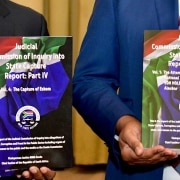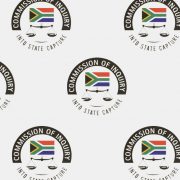|
Getting your Trinity Audio player ready...
|
A lot can happen in a political year, and anyone holding Finance Minister Pravin Gordhan’s last two budget speeches side by side can see evidence of this. Gordhan presented his 2016/17 budget under extreme political pressure on Wednesday – amid some speculation that it may very well be his last – and thus it lacked somewhat the bold, authoritative tone of last year’s on certain key issues such as the poor administrative leadership and decisive action against supply chain management transgressions within the public sector.
He attempted to make up for this, however, in the highlighting the cost-effective ways in which government has managed the public procurement space, particularly the achievements of the Office of the Chief Procurement Officer (OPCO), including the irregularities this office has unearthed.
Of the OCPO, he said the following:
- The OCPO currently manages 71 transversal contracts covering over 23 000 items worth R61-billion. Good progress is being made to find better value for money while expanding and diversifying the number of suppliers.
- Savings of R675-million in 2016/17 on cell phones and vehicle contracts. The vehicle contract alone is expected to save the state between R1-billion and R1.5-billion per year over the medium term.
- In the property leasing sector, we expect savings of between R2- and R3-billion to be realised, while releasing resources for greater employment and contracting in building maintenance and services.
- Collaborative efforts between SITA and National Treasury have led to potential savings of R2.5-billion over the next three years in the 10 largest ICT equipment contracts.
- Working with the Department of Basic Education on cost-effective standards for building design, the average cost of new schools has been slashed from R70-million for 7 500 square meters to R34-million.
These achievements, said Gordhan, were made in a climate of continuing disregard for the rule of law. The OPCO was still finding evidence of state employees doing business with government, despite this being outlawed. Discrepancies in details of suppliers or potential suppliers were also being investigated, as were payments from the state to accounts other than those registered in the central supplier database, established in 2015.
“The central supplier database enables government to know who it is doing business with and to use technology to reduce opportunities for fraud and corruption,” he said.
He went on to mention the readiness of the Public Procurement bill, which he said would “establish a single procurement authority and will consolidate the currently fragmented regulatory environment.” The bill would be published soon.
In last year’s address, Gordhan highlighted waste, corruption and the continuous bailing out of state-owned entities (SOEs) as some of the ills that the South African public wanted to see eradicated urgently. “Our aim is to strengthen our state entities so that they can play a propulsive and dynamic role in our development,” he said. “Further financial support to state-owned companies will depend on clarity of this mandate and firm resolution of governance challenges.”
Again his toned-down approach was evident this year, however: “…Cabinet has endorsed a series of measures to reinforce governance and accountability and clarify [SOE] development mandates. This imposes substantial obligations and responsibilities on boards and senior managers. We expect the highest standards of ethical leadership and understanding.”
In the year since Gordhan’s last speech, the leadership challenges at three of the most vital of SOEs –Eskom, South African Airways and the Passenger Rail Agency of South Africa – have come to light in numerous media reports. “With a combined asset base of R1.2- trillion, the SOEs are well-placed to partner with private sector investors in growing the productive capacity and infrastructure of our economy. But they must be financially strong, governance must be sound, and boards and executives must have the necessary competencies to run complex business enterprises.”
Again in comparing last year’s and Wednesday’s speeches, Gordhan noted that public sentiment holds that government does two things right: tax administration and social grants. Ironically, this year, the status of the social grant distribution system came under scrutiny just hours before his address. Social Development Minister Bathabile Dlamini appeared before Parliament on Wednesday morning to answer to questions about the readiness of the South African Social Services Agency (Sassa) to take over grants distribution from private contractor Cash Paymaster Services (CPS) at the end of March. The picture painted by the minister was all but reassuring, despite her insistence that all 17-million grant beneficiaries would receive their payouts come 1 April.
Sassa was supposed to have been ready to take over the distribution by this date as per stipulations in its rollout of the project in 2012. According to Dlamini, the agency was not ready to do this, and would need roughly another five years to catch up. Gordhan made no mention of this challenge, understandably because it is currently playing itself out in the appropriate structures.
The social grants conundrum could potentially cost the state figures well into the billions. Only time will tell if Gordhan stays in office long enough to oversee this massive expenditure drawback.
• Image: Kopano Tlape, GCIS







